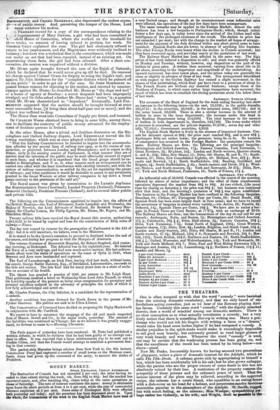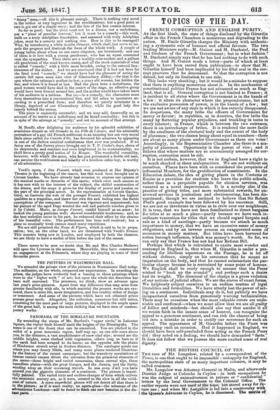THE THEATRES.
One is often tempted to wish that the word " comedy " were banished from the existing dramatic vocabulary, and that we only heard of our forefathers acting comedies, just as we hear of the Romans playing Atel- lan farces. Certainly this same word " comedy," with the dignity attached thereto, does a world of mischief among our dramatic authors. There is no clear conception as to what actually constitutes a comedy, but a very lively notion that there is something literary in writing one. Many a gen- tleman who would not ink his fingers with writing a farce or a "drama," would raise his head some inches higher if he had composed a comedy. A similar prejudice in the spirit-trade would make it exceedingly despicable to sell good neat brandy, but extremely genteel to vend larger glasses of very weak brandy and water. Whenever the word "comedy " is used, one may be certain that the weakening process has been going on, and that the excellence of the result has been tested by its being below—not above—proof.
Now Mr. Peake, honourably known for having amused two generations of playgoers, writes a piece of dramatic interest for the Adelphi, which he calls The Title-Deeds. A cabman grows rich by appropriating to himself a box, which has been accidentally left in his cab; but he also grows unhappy, while the parties who are the proper owners of some deeds in this box are absolutely ruined by their loss. A restitution of the property restores the prosperity of these persons and the cabman's peace of mind. That the serious interest of the piece may be relieved, according to the approved recipe, the cabman has a comic friend, who squabbles in an eating-house with a dish-cover on his head for a helmet, and perpetrates sundry facetious enormities peculiar to the atmosphere of the Adelphi. 0. Smith, rugged, but with much feeling, as the cabman ; Miss Woolgar, sympathizing per- haps rather too violently, as his wife; and Wright, droll as possible in the " funny " man,—all this is pleasant enough. There is nothing very novel in the notion or very ingenious in the combinations; but a good point or two is got out of a simple story; and the fate of the box creates interest.
So far so good: but the piece must not be a drama, nor a melodrama, nor a "piece of peculiar interest," but it must be a comedy—this work, built on a truly Adelphian foundation, and seasoned with truly Adelphian jokes, must be a comedy and nothing else. How is this to be managed? Why, by introducing a white muslin element, which shall just serve to im- pede the progress'and-diminish-the force of the Whole work. A couple of young ladies, about whom no one cares sixpence, are introduced; and one of them is in love with a young gentleman, who has an equal command over, the sympathies. Then there are a worldly-wise mother, and a gallant old gentleman of the most known stamp, and all the stock materials of what is called "comedy," with a little more breadth, owing to the natural face- tiousness of the author. And we are convinced that if it had not been for the fatal word "comedy," we should have had the pleasure of seeing the certain fall upon some nice view of Glastonbury Abbey,—for that is the spot where the cabman's mother-in-law, a crazy old woman, has hidden the box and where it is found at last. Had the piece been a melodrama, the good woman would have died in the centre of the stage, an effective group would have been formed around her, and the author would have taken leave of his audience in a tableau. But no,—in a comedy, the characters must form themselves into a conventional line, and bid adieu to spectators ac- cording to a prescribed form; and therefore we quietly terminate in a library, deprived of our Glastonbury Abbey, while the good lady dies tamely behind the scenes.
The piece is eminently successful; and we may add, deservedly so, on account of its merits as a melodrama and its broad comicality: but this is in spite of the attempt at " comedy," and not on account of that attempt.



























 Previous page
Previous page